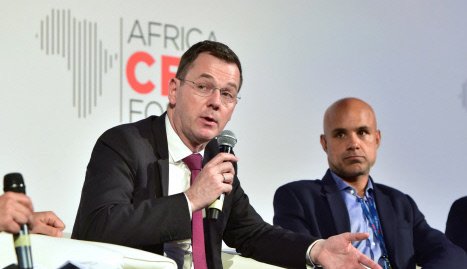
Sérgio Pimenta, Vice President for the Middle East and Africa at the International Finance Corporation (IFC) has praised the resilience of Africa’s financial sector as it endures the economic gales triggered by the coronavirus epidemic, citing the larger capital reserves African banks have developed, and quick moves by regulators to shore up the sector.
Pimenta is a keen observer of the world of African finance. In charge of a committed portfolio of nearly $18bn at the IFC, this Portuguese and French national, who holds degrees from top Paris universities (École Polytechnique and École Nationale des Ponts et Chaussées), Pimenta has spent nearly 25 years working his way up the IFC’s ranks. He talks here about the state of Africa’s financial industry amid the Covid-19 crisis and the challenges that await the continent.
How are African banks handling the crisis?
The Covid-19 crisis has very severely impacted African economies. For the first time in 20 years, the entire African continent is experiencing a recession.
But the financial sector has actually withstood this crisis better than the previous crises. Most financial firms in sub-Saharan Africa are managing to survive the crisis so far, which is a testament to their resilience. There are several reasons for this.
First, they had a more robust capital base and, in all likelihood, higher liquidity levels than before. Second, in a significant number of countries, central banks have provided some form of support to stabilise economies by lending and cutting interest rates.
So, you have a situation where banks have thus far better managed the crisis overall compared with the 2007-08 global crisis. And that is relatively good news in this context. Now, we’re going to need to continue to monitor their response because there are still important risks and challenges ahead.
How do you think the situation will evolve for African banks in the medium term?
Bank performance levels are deeply tied to the health of the regional and global economy, and the outlook for these areas of the economy is still quite uncertain.
It’s not easy to guess what banks are going to do in 2021 and 2022. Local demand is still relatively flat, interest rates are low and, potentially, there will be less government aid, so all of these factors will create challenges for the sector.
Overall, I don’t think bank revenues will return to pre-crisis levels before 2022 and we may even have to wait until 2024.
It all depends on how quickly the range of possible scenarios unfold. In the current climate, what’s likely is that banks will have a higher risk aversion and tighten their purse strings, which is the opposite of what they should do because the economy needs banks that are way more active and ready to take risks.
What can be done to help support African economies?
Financial institutions will play a vital role in the recovery. There will be significant financial needs going forward. Some estimate that they could reach $290bn between now and 2023, and only about half of this amount will be covered by private capital.
As a result, we’ll probably see international financial institutions and bilateral donors step up to provide support, which will likely meet a quarter of the total need.
But even with their help, that leaves a gap of tens of billions of dollars. So, domestic banks in Africa are going to have to increase their lending. IFC has a part to play in supporting banks and reducing their risk aversion.
African banks may wait until 2024 to return to pre-crisis revenues – IFC (theafricareport.com)


